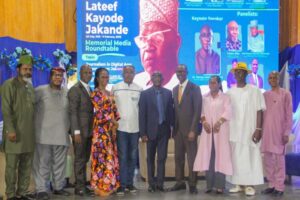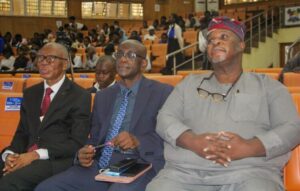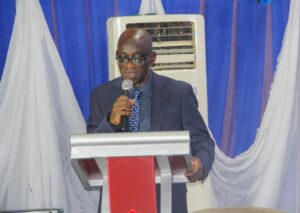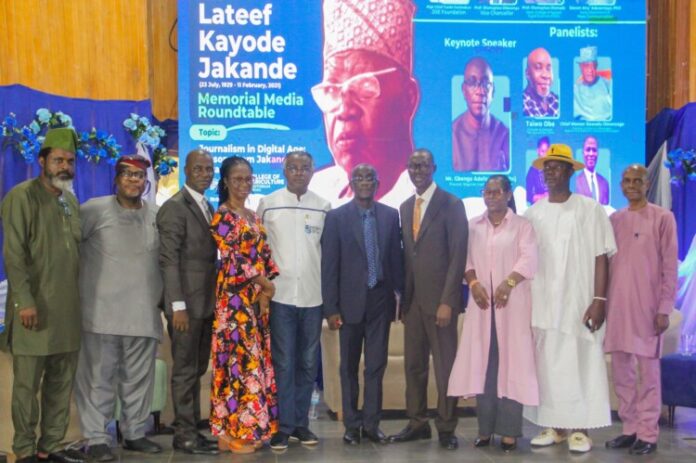Veteran journalist and Provost of the Nigerian Institute of Journalism, NIJ, Mr. Gbenga Adefaye, has urged media practitioners to uphold credibility and civic responsibility in the face of rapid digital transformation.
Speaking at a memorial media roundtable held in honour of the late Alhaji Lateef Jakande, renowned journalist and former Governor of Lagos State, Adefaye emphasized that the future of journalism depends not only on adapting to new technologies but also on anchoring them in the time-tested values of truth, transparency, and public service.
“Credibility remains the most critical currency in this digital age,” Adefaye stated during his keynote address at the event, organized by the Department of Mass Communication, Lagos State University of Science and Technology (LASUSTECH), in partnership with the DSE Foundation.


“We must guide digital transformation with the integrity that defined Jakande’s journalism.”
Highlighting Jakande’s career as a model of principled media practice, Adefaye noted, “While the tools of journalism have changed, from print and broadcast to social media and data dashboards, the mission remains the same: to inform, educate, and hold power to account.”

Warning against the growing commodification of journalism, he stated, “It must remain a mission-driven civic enterprise, not a commercial cartel. Monetize the truth, but never compromise it.”
Encouraging young journalists to harness digital tools like data journalism, immersive storytelling, and AI-assisted research without losing sight of their duty to the public, Adefaye said: “Journalism should not devolve into personal branding. It must continue to foster public reasoning and deepen democracy.”
The event featured a panel of distinguished media figures, including the publisher of Oriwu Sun, Chief Monzor Olowosago; media trainer Mr. Taiwo Obe; journalism advocate Mr. Lekan Otufodunrin; and General Manager of Lagos Television (LTV 8), Mrs. Adesola Kosoko.
The panelists echoed Adefaye’s message, collectively emphasizing that the essence of journalism lies not in its medium but in its ethical foundation.
In his opening remarks, the Vice Chancellor of LASUSTECH, Professor Olumuyiwa Odusanya, described the roundtable as a timely tribute to Jakande’s dual legacy in journalism and governance. “It is our contribution to the memory of the ‘Action Governor,’ whose life continues to model visionary leadership and media excellence. We are proud to honour his enduring impact on education, journalism, and public service.”
He also expressed optimism about continued collaboration with the DSE Foundation, praising the initiative as the start of a meaningful partnership. The Vice Chancellor commended the Acting Head of the Mass Communication Department, Dr. Steve Adesemoye, for spearheading the event and affirmed the university’s commitment to advancing credible journalism.
In a joint communiqué issued after the event, the Mass Communication Department at LASUSTECH signaled its intention to act on the suggestion to explore and archive Jakande’s journalistic works. “Inspired by Mr. Adefaye’s call to action, we are keen to collaborate with stakeholders to uncover and preserve Jakande’s untapped media legacy,” the statement read.
The Jakande Memorial Roundtable not only celebrated a pioneering figure in Nigerian journalism but also provided a critical forum for media professionals, scholars, and students to reimagine journalism as a force for good in a rapidly evolving digital world.


